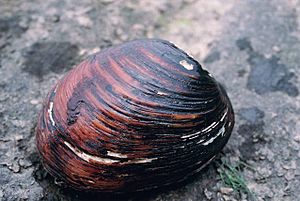Pink mucket facts for kids
Quick facts for kids Pink mucket |
|
|---|---|
 |
|
| Conservation status | |
| Scientific classification | |
| Genus: |
Lampsilis
|
| Species: |
abrupta
|
The pink mucket (also called Lampsilis abrupta) is a special kind of freshwater mussel. It's a small aquatic animal that lives in water. This mussel is a bivalve, which means it has two shells that open and close. It belongs to a family called Unionidae, known as river mussels. The pink mucket is found only in the United States.
Contents
Life Cycle and Reproduction
The pink mucket has a shell that is round and a bit long. Its shell is thick, puffy, and smooth. It usually has a yellow-brown color. You can find these mussels at the bottom of rivers and streams. They like to live among small rocks and pebbles. They can live in water that is just an inch deep or as deep as five feet.
Pink mucket mussels can live for up to 50 years. However, today, they rarely live that long. Since 1976, the pink mucket has been an endangered species. This means it is at risk of disappearing forever.
Pink mucket mussels reproduce like most other freshwater mussels. They need a calm and safe place to live. First, the male mussel releases tiny sperm into the water. The female mussel then pulls this sperm into her body through a tube called a siphon. Inside her gills, the eggs get fertilized.
After the eggs are fertilized, they grow into tiny larvae. These larvae are called glochidia. The female mussel then releases these glochidia into the water. The glochidia need to attach to a host fish to grow. They often attach to the gills of fish like black bass or walleye.
The larval mussel stays on the host fish for a few days or weeks. During this time, it changes and grows. Once it becomes a young mussel, it drops off the fish. It then settles on the river bottom. Pink muckets usually lay their eggs from August to September. They release their glochidia the next year, from May to June.
Why Pink Muckets Are Disappearing
Long ago, pink mucket mussels lived in 26 different rivers. These rivers were in the Midwest and eastern parts of the United States. But their numbers have dropped a lot.
One big reason is the building of dams and reservoirs. These structures cause rivers to flood. This flooding destroys the mussel's home. It also harms the host fish that the mussels need to reproduce.
The quality of the water has also gotten worse. Dirty water and too much silt (fine dirt) hurt mussel populations. Other activities also cause problems. These include digging up riverbeds (dredging) and mining for gravel. Cutting down trees along riverbanks also harms them. Pollution from farms and cities also flows into rivers. All these things have made the pink mucket numbers go down.
Helping Pink Muckets Recover
Mussels are very important for healthy rivers. They are like natural filters. They pump water through their bodies to find food. As they do this, they collect important nutrients. They also remove bad things from the water. This helps keep the water clean for other animals and plants.
Many groups and people are working to save the pink mucket. They are trying to help the mussels recover. Protecting and managing the pink mucket means taking care of its habitat. It also means keeping the water quality good in the large rivers where they live.
For example, some landowners report mussel poaching. This is when people illegally take mussels. They call their local conservation officers to stop it. Other states are also working hard. The state of Kentucky has a plan called Kentucky’s Wildlife Action Plan. This plan helps decide what to do to save animals and plants that are endangered.
In 2007, Kentucky raised pink mucket mussels at a special center. They released 1,100 of these mussels into the Green River. The state plans to keep working on this for many years. They want to increase the number of mussels in the wild. The states of Tennessee and Alabama have also set up special mussel safe places. These are in parts of the Cumberland and Tennessee Rivers. They have also successfully helped mussels reproduce in these areas. People hope that the pink mucket will recover more and more over the years.
See also
 In Spanish: Lampsilis abrupta para niños
In Spanish: Lampsilis abrupta para niños


